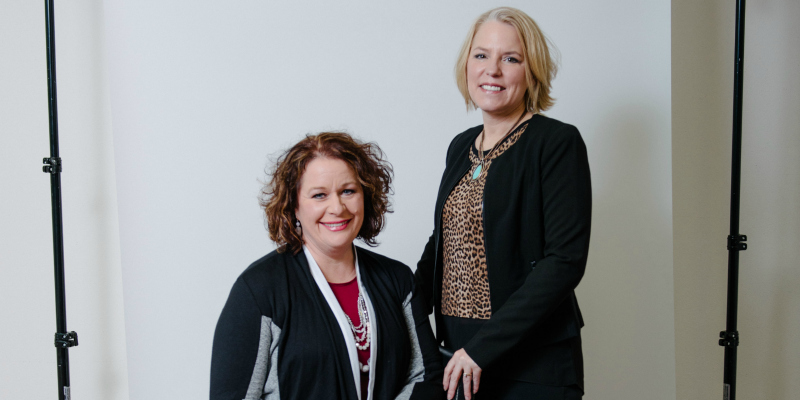Photographed by Hillary Schave
The business plan for the Stimmi app started with manila folders. As primary caretaker for her 25-year-old nonverbal son with autism, Deb Thompson worried what would become of him if something happened to her and her husband.
“Evan and I are one. I know what he’s saying. I know what he wants. I know what he needs… and I thought ‘If I don’t write these things down, it’s going to get lost and then he’d be lost.’”
With that stark reality driving her, Thompson wrote separate categories on manila folders around features she was envisioning in a system that would allow caregivers to trade notes. Technology admittedly not a strong suit, she shared her vision with others, but no one would latch on. That is, until summer 2016 when she bumped into former Mary Kay colleague Laura Berkner at a friends’ night out.
Berkner got goose bumps when Thompson told her the concept for Stimmi. With a background in the caregiving industry and extensive experience working with special needs adults, Berkner recognized the profound value this could provide, across several different sectors.
“I didn’t realize it didn’t exist,” admits Berkner, who has had patients take a swing at her because of sensory issues—just one example of small notations that make a big difference but don’t always make it into the outdated patient binder system currently in use at group homes.
“My brain was like ‘Anybody with disabilities could benefit from this, and we need to make this happen,’” says Berkner, who immediately agreed to use her tech savvy to help Thompson build an app.
With an audience that has such a wide spectrum of needs, Stimmi was intentionally developed to be completely customizable. Users can input information about emergency contacts, power of attorney, common safety and behavior issues, dietary requirements and supplements taken, doctor and therapist contacts.
Probably the most unique feature is the voice library, allowing primary caregivers to record and explain the personal language of the individual needing care. Completely searchable, the voice library allows secondary caregivers, teachers, and job coaches a crucial head start in understanding the individual they’ll be working with.
When the voice library is paired with the behavior and safety tabs, even more insight is provided on things to watch for. For instance, Evan will use a whole roll of toilet paper if no one tells him to stop. He has also has been known to open the car door before the driver comes to a complete stop. Both of these notes can easily be shared through Stimmi, before a caregiver even meets Evan.
Focusing on Dane County and Wisconsin as they secure funding and develop the app fully, Berkner and Thompson hope to eventually launch nationwide and include military families in their scope. The Thompsons were stationed at Ramstein Air Base in Germany when Evan was diagnosed at age 2. Stimmi has its roots in the German word stimme, meaning voice.
“That’s essentially what we want to give,” says Thompson, “is the children and the adults a voice to their caregivers.”
–Candice Wagener




